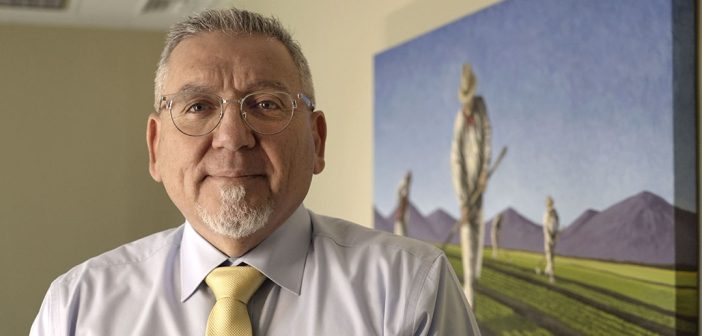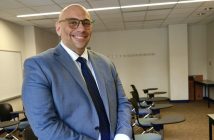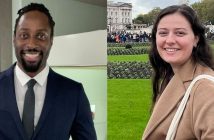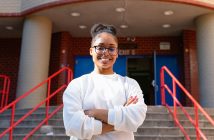In July 2021, Fordham welcomed José Luis Alvarado, Ph.D., to New York as the new dean of the Graduate School of Education. Alvarado, who came to Fordham from Cal State Los Angeles, is a longtime leader in higher education and advocate for students living in rural, diverse, and low-income communities; his move was his first to the East Coast. Fordham News sat down with him a year into his tenure to reflect on both his time both at Fordham and the state of the teaching field.
Q: How would you describe your priorities in your first year as dean?
A: GSE is an amazing place. There are lots of talented faculty and staff. My focus has been on creating a great foundation for the work that still lies ahead. When I met with the staff and the faculty, I shared with them my top three priorities that are easy to remember. Priority number one, students first. Priority number two, students first. Priority number three, students first.
Q: How are you planning to increase student enrollment?
A: We have amazing programs, and we want to make sure that students have the opportunity to be trained by our exemplary faculty. One such program is our accelerated master’s program. We have a value proposition that the quality and the rigor they’re going to get here is unmatched. In the accelerated master’s program, undergraduate students are able to enroll in graduate courses during their senior year and those courses count towards their undergraduate degree and towards teacher certification. In the end, students save a year’s worth of tuition as they finish their Master of Science in Teaching plus teacher certification in one additional year beyond the completion of the undergraduate degree.
Fordham undergraduates understand this to be a great value. Students who graduate from Fordham are proud to be Fordham graduates. So, we want to serve students who are currently in our undergraduate programs and who realize the benefits of continuing their education to earn their graduate degree and teacher certification from us in just one more year. I have worked with one of our clinical faculty to try and grow it, and we’re definitely moving in the right direction. I see us reaching 150 students in about three years.
Q: How are you working to diversify the student body and the faculty?
A: We implemented a system that allows us to track the diversity of the applicant pool so that we know whether we’re being successful in recruiting a sufficient number of diverse faculty from underrepresented groups. We are continuing to work on plans to launch a doctoral fellowship for Ph.D. candidates who aspire to be faculty in higher ed. We’re a doctoral training institution that is training tomorrow’s faculty. Why can’t we create systems that make it possible for students of color, students from underrepresented groups, or students who are committed to working with diverse communities, to earn these Ph.D.’s at Fordham and to go and work as faculty?
Q: What do you feel has changed the most for teachers in the last 15 years?
A: The biggest and most recent impact has been the consequences of COVID. Most teachers went through their preparation programs and were equipped to teach in traditional modalities—that is, in person, face-to-face. COVID forced every teacher to teach their students remotely. That goes along the lines of what has really changed for teachers, which is the overwhelming influence that technology has had on teaching and learning. Whereas teachers 10, 15 years ago, focused most of their efforts on in-class, in-person experiences, teachers today are dedicating a whole lot of time to having a web presence or email responses. Our programs have to adapt to ensure that we train teachers who are prepared to address the varied needs of the students they serve and are able to thrive in today’s schools
Q: How would you describe the state of teacher satisfaction today?
A: There is a segment of the teaching force is under tremendous pressure from political influences that are encroaching on teachers’ ability to teach their students. A survey from April 2022 called the Merrimack College Teacher Survey found that 56% of teachers are satisfied or very satisfied with being a teacher. But not all is well, many still feel that their salary is not fair, which goes to the issue of public funding for education and the need to focus on teacher compensation. What’s interesting is, some teachers are also more satisfied than others. Male teachers tend to be more satisfied than female teachers with their compensation, and secondary teachers or high school teachers are more satisfied than elementary teachers.
Teachers often feel overwhelmed not just by the time that they spend teaching, but all of the other demands as well. In fact, the Merrimack survey noted that Black teachers, more so than white or Hispanic teachers, spend more time working outside of the classroom. That’s because of community engagement, and making connections with parents through after school activities.
Q: What role do you see GSE playing in addressing this problem?
A: One of the things that we’re involved in is advocacy in trying to ensure that teacher compensation is fair and equitable. Local districts have to contend with state allocations for funding, and until those issues are addressed at the state and national levels, those pervasive kinds of challenges will remain. In addition to advocacy to increase public funding for school teachers, we’re also preparing teachers who understand that many of us choose the career not because of the pay, but because of the impact that it’s going to have on others. This in no way implies that we believe that teachers should be paid less. We believe that teachers deserve compensation that is commensurate with their level of training as professionals. Current levels of teacher compensation need to increase to retain and attract the best talent out there.
Q: It seems like with nonprofit jobs, the word vocation gets used as a justification to pay a smaller salary. Do you agree?
A: Of course, but that’s not an excuse. Just because it’s a vocation does not mean that you underpay individuals who are choosing to go in that career. It should be appropriately respected and compensated, because teaching is foundational for all other careers. The preparation of teachers will ensure that we have individuals who are well prepared to earn business, science, or law degrees. It was a teacher who taught those students how to read. It was a teacher who taught them basic mathematics. It was a teacher who inspired them to pursue whatever their dreams are. Teachers should not end up in a situation where they have to take second and third jobs just to keep their job. Lawyers don’t do that. Brokers on Wall Street don’t do that. Why do we expect teachers to do that?
Q: Can you expand a little bit upon how the needs of students have changed, particularly with respect to what they need from teachers and counselors when it comes to mental health? How has GSE been confronting this issue?
The socio emotional health of students is a very real need, and it’s been there all along. It has just come more up to the forefront because of the sort of dramatic increase in school violence. I worked with kids with significant emotional behavioral disorders. I know that those needs have been there all along; it’s just that now those kids have access to weapons of war. Teachers also have to contend with issues like cyberbullying.
Our Center for Educational Partnerships offers ongoing professional development for equipping existing teachers to support the social-emotional health of their students. That’s a huge component in our pre-service preparation. It’s always been in our program, but now it’s emphasized even more so.
Q: What advantage does GSE have over other schools by virtue of being part of a Jesuit university?
Our curriculum is grounded on principles of equity and social justice and and in the Jesuit tradition of cura personalis. We aim to train teachers who address the needs of their students a whole person. There is so much potential in every child, and our professors understand that our teachers are driven by those Jesuit principles of seeking justice and using education as a way to transform individuals and families and communities. St. Ignatius, the founder of the Society of Jesus, was committed to seeking truth and in doing so, trying to create a more just world that addressed inequities and unfairness. I believe that every teacher that we prepare is always seeking truth and justice.
The reason we place teachers [in field placements]in high need schools is that’s where our teachers are needed the most, and that’s where we believe they can make the biggest impact. Part of the reason is in some ways is to inoculate GSE students to the harsh realities of what’s out there in schools while they’re receiving support. We’re preparing candidates for the what the real world is like, where they’re most likely to end up, but also most importantly, where they’re going to have the biggest impact on students who need them.
We need a teaching force that understands the challenges of school districts that are diverse and have high needs, and that is committed for the long term. Those students deserve the stability and the support of long-term teachers, not just those who are putting in their “time in” before moving onto wealthier districts. That’s what St. Ignatius would want you to do.
Q: Any final thoughts as you begin your second year?
A: It’s been just a pleasure getting to meet the faculty, my colleagues and my peers. I feel really welcome and supported. I couldn’t ask for a better situation to be in.



